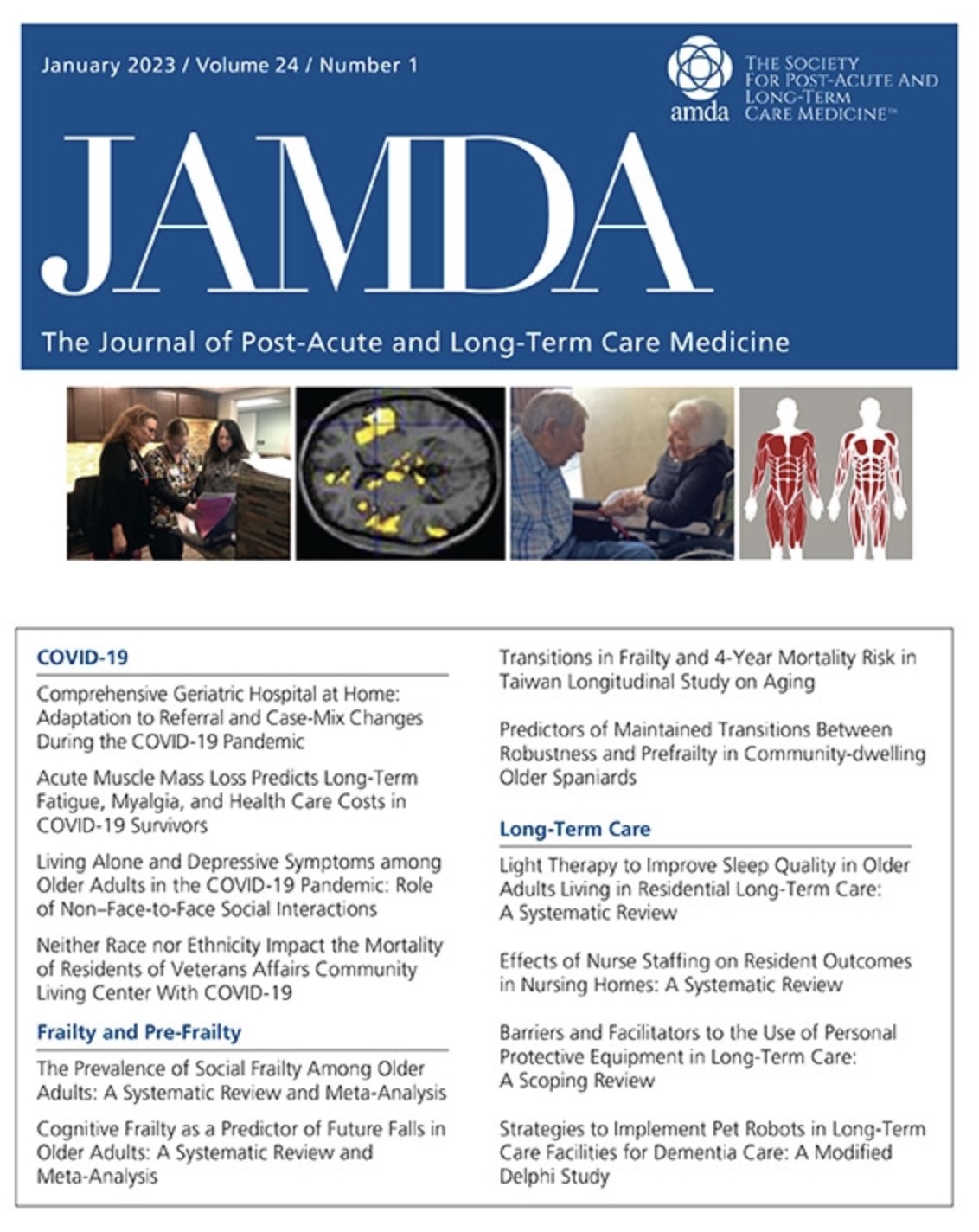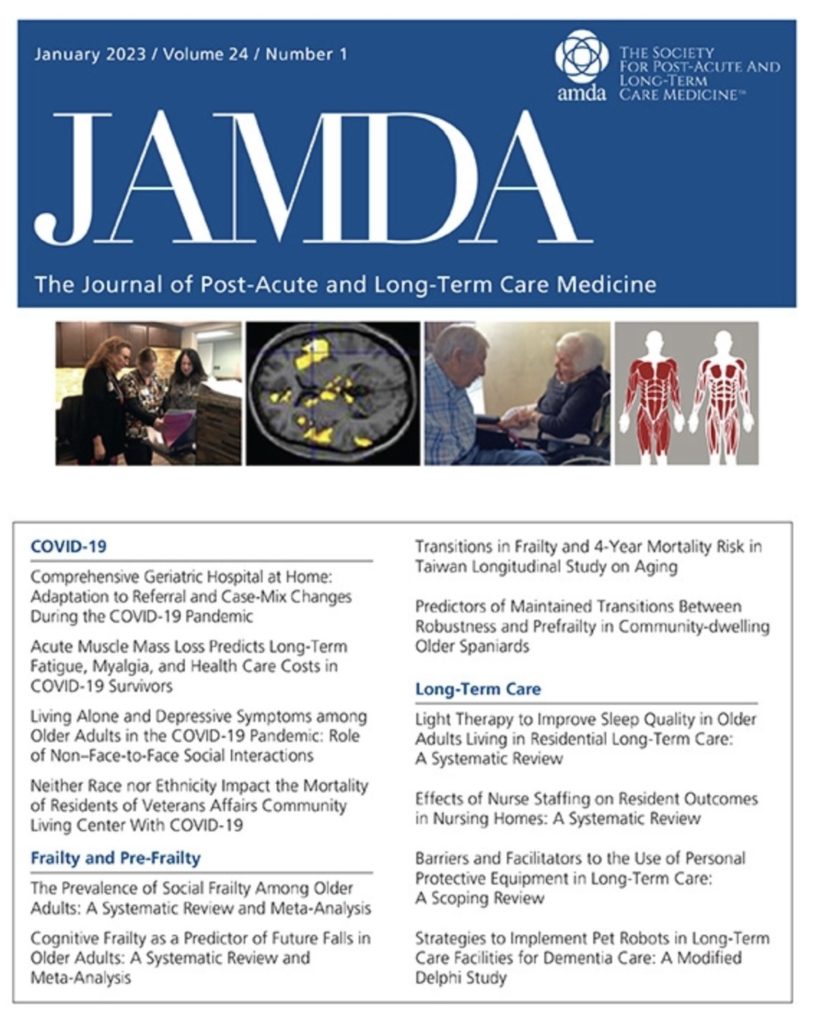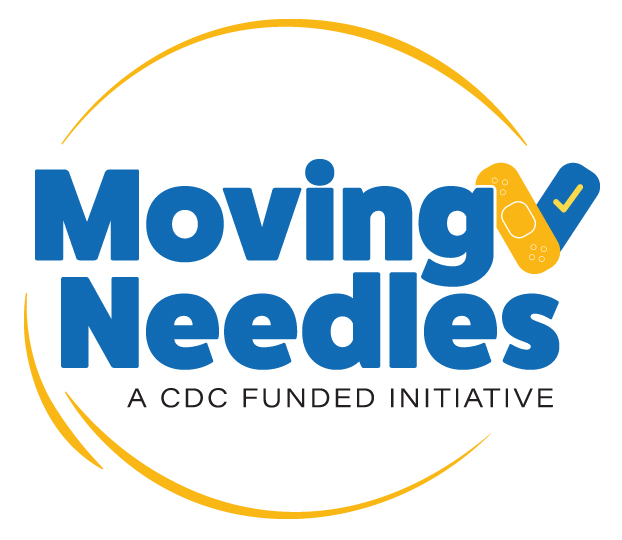Objectives To examine the associations between COVID-19 pandemic waves (1–4) and prevalent antipsychotic, antidepressant, benzodiazepine, anticonvulsant, and opioid use among assisted living (AL) residents, by setting (dementia care vs other). Design Population-based, repeated cross-sectional study. Setting and Participants Linked clinical and health administrative databases for residents of all publicly subsidized AL homes (N = 256) […]
COVID-19
Effect of Quarantine on Body Weight Among Residents of Assisted Living Facilities During the COVID-19 Pandemic
Effect of Quarantine on Body Weight Among Residents of Assisted Living Facilities During the COVID-19 Pandemic
Assisted living facility (ALF) residents are at greater risk of declining health and death from coronavirus disease 2019 (COVID-19) due to advanced age, frailty, chronic conditions, and transmission prevention methods. One method, room quarantine, can lead to isolation and potential weight changes. Continuous room quarantine was mandated by the state for all nursing home and […]
Barriers to Infection Prevention and Control in Long-term Care/Assisted Living Settings in British Columbia During the COVID-19 Pandemic: A Cross-Sectional Survey
Barriers to Infection Prevention and Control in Long-term Care/Assisted Living Settings in British Columbia During the COVID-19 Pandemic: A Cross-Sectional Survey
Background The COVID-19 pandemic disproportionately impacted long-term care and assisted living (LTC/AL) facilities in Canada, where infection prevention and control (IPAC) programs had been suboptimal. We aimed to identify barriers affecting healthcare workers’ (HCW) adherence to IPAC practices during the pandemic in British Columbia in LTC/AL compared to acute care settings. Methods We conducted a […]
Comparing Quality of Care Outcomes Between Assisted Living and Nursing Homes Before and During the COVID-19 Pandemic
Comparing Quality of Care Outcomes Between Assisted Living and Nursing Homes Before and During the COVID-19 Pandemic
Background While assisted living (AL) and nursing home (NHs) residents in share vulnerabilities, AL provides fewer staffing resources and services. Research has largely neglected AL, especially during the COVID-19 pandemic. Our study compared trends of practice-sensitive, risk-adjusted quality indicators between AL and NHs, and changes in these trends after the start of the pandemic. Methods […]
Primary Care Telemedicine Use among Assisted Living Residents with Dementia during COVID-19: Race and Dual Enrollment Status
Primary Care Telemedicine Use among Assisted Living Residents with Dementia during COVID-19: Race and Dual Enrollment Status
WHAT THIS MEANS FOR YOU: This study used Medicare and CDC datasets to examine telemedicine primary care among 62,000 AL residents with dementia during the first year of the COVID-19 pandemic (2020). During the first three quarters of the pandemic, racially minoritized groups (Black, Hispanic) and Medicare-Medicaid dual eligibles were able to successfully use telemedicine at high rates. Gaps in primary care access between these groups and others (white, non-Medicaid eligible) were reduced due to telemedicine. This could inform CMS decisions about Medicare coverage for telemedicine primary care.
Caregiver Involvement and Concerns with Care of Residents of Assisted Living Before and During the COVID-19 Pandemic
Caregiver Involvement and Concerns with Care of Residents of Assisted Living Before and During the COVID-19 Pandemic
WHAT THIS MEANS FOR YOU: A survey about AL family caregiver experiences in Western Canada was conducted before and during waves one (Mar to Jun 2020) and two (Oct 2020 to Feb 2021) of the COVID-19 pandemic. A total of 386 family caregivers representing 110 AL communities participated. In-person visits and caregiver involvement decreased significantly during wave one of the pandemic due to visitor restrictions. Caregivers’ concerns about their relatives significantly increased during both waves, especially when they did not feel well-informed or involved in their relative’s care.
COVID-19 in Assisted Living: Protecting a Critical Long-Term Care Resource
Digital Immunization Tracking in Long-Term Care and Assisted Living Facilities
Digital Immunization Tracking in Long-Term Care and Assisted Living Facilities
WHAT THIS MEANS FOR YOU: Vaccines are a part of the solution to infectious disease outbreaks like COVID-19, but not everyone is getting them, especially older adults. In a Canadian study, pneumonia vaccine uptake was improved by providing assisted living and long-term care communities with vaccine coverage data and providing automatic reminders for subsequent doses. Therefore, a cloud-based digital vaccination record is one solution to promote the uptake of adult vaccines for older adults, as well as tracking immunization records and sharing them with policymaking organizations. This can improve communication and inform policymakers to reduce the risk of infection in AL communities.
Preparedness and Response of Assisted Living Facilities Toward COVID-19 Infection Control in Houston, Texas, USA
Preparedness and Response of Assisted Living Facilities Toward COVID-19 Infection Control in Houston, Texas, USA
WHAT THIS MEANS FOR YOU: The Houston Health Department conducted onsite assessments at AL communities to assess infection prevention and control practices. Larger AL communities better implemented CDC guidelines and were more proactive in their COVID-19 response activities. For example, many medium and small communities lacked access to COVID-19 PCR testing and had lower resident vaccination rates.

COVID-19 Resources
COVID-19 Resources
Please visit the following sites for resources and information on COVID-19.
Coping Behaviors and Health Status during the COVID-19 Pandemic among Caregivers of Assisted Living Residents in Western Canada
Coping Behaviors and Health Status during the COVID-19 Pandemic among Caregivers of Assisted Living Residents in Western Canada
Objectives To examine the prevalence of coping behaviors during the first 2 waves of the COVID-19 pandemic among caregivers of assisted living residents and variation in these behaviors by caregiver gender and mental health. Design Cross-sectional and longitudinal survey. Setting and Participants Family/friend caregivers of assisted living residents in Alberta and British Columbia. Methods A […]
Excess Mortality Among Assisted Living Residents with Dementia during the COVID-19 Pandemic
Excess Mortality Among Assisted Living Residents with Dementia during the COVID-19 Pandemic
Objective To evaluate whether assisted living (AL) residents with Alzheimer’s disease and related dementias (ADRD) experienced a greater rate of excess all-cause mortality during the first several months of the COVID-19 pandemic compared to residents without ADRD, and to compare excess all-cause mortality rates in memory care vs general AL among residents with ADRD. Design […]
Caregivers’ Concerns about Assisted Living Residents’ Mental Health during the COVID-19 Pandemic: A Cross-Sectional Survey Study
Caregivers’ Concerns about Assisted Living Residents’ Mental Health during the COVID-19 Pandemic: A Cross-Sectional Survey Study
Family or friend caregivers’ concerns about assisted living (AL) residents’ mental health are reflective of poor resident and caregiver mental health. COVID-19-related visiting restrictions increased caregiver concerns, but research on these issues in AL is limited. Using web-based surveys with 673 caregivers of AL residents in Western Canada, we assessed the prevalence and correlates of […]
Coronavirus Disease 2019 (COVID-19) in Assisted Living Communities: Neighborhood Deprivation and State Social Distancing Policies Matter
Coronavirus Disease 2019 (COVID-19) in Assisted Living Communities: Neighborhood Deprivation and State Social Distancing Policies Matter
Background: Residents of long-term care facilities face significantly greater risk of contracting or dying from coronavirus disease 2019 (COVID-19). However, little is known about COVID-19 in assisted living communities (ALCs) and the potential determinants of its spread. We examined the association between COVID-19 cases in ALCs and the proportion of Medicare-Medicaid (dual) eligible minority residents, […]
Prevalence and Correlates of Anxiety and Depression in Caregivers to Assisted Living Residents during COVID-19: A Cross-Sectional Study
Prevalence and Correlates of Anxiety and Depression in Caregivers to Assisted Living Residents during COVID-19: A Cross-Sectional Study
Background Family and friend caregivers play significant roles in advocating for and ensuring quality health and social care of residents in Assisted Living (AL) homes. However, little is known about how the COVID-19 pandemic and related visitor restrictions affected their health and mental well-being. We examined the prevalence and correlates of anxiety and depressive symptoms […]
Dementia and COVID-19 Infection Control in Assisted Living in Seven States
Dementia and COVID-19 Infection Control in Assisted Living in Seven States
Background Assisted living (AL) is the largest residential long-term care provider in the United States, including for persons with Alzheimer’s disease and related dementias. Despite recognizing the challenge of infection control for persons with dementia, this study of 119 AL communities is the first to describe dementia-relevant COVID-19 infection control across different types of AL […]
The Impact of FFC-AL-EIT-D in Assisted Living during the COVID-19 Pandemic
The Impact of FFC-AL-EIT-D in Assisted Living during the COVID-19 Pandemic
The purpose of this study was to test the preliminary effectiveness and feasibility of implementation of Function Focused Care for Assisted Living Using the Evidence Integration Triangle in Assisted Living Communities with Residents with Dementia (FFC-AL-EIT-D) during the pandemic. This was a single group pre-post study design including 51 communities in a single state. The […]
“We Weathered the Storm”: A Qualitative Phenomenological Study of the Lived Experience of Assisted Living Administrators during the COVID-19 Pandemic
“We Weathered the Storm”: A Qualitative Phenomenological Study of the Lived Experience of Assisted Living Administrators during the COVID-19 Pandemic
The purpose of the current qualitative phenomenological study is to learn about the lived experiences of assisted living (AL) community administrators during the coronavirus disease 2019 (COVID-19) pandemic. Little is known about how administrators coped with the ever-changing mandates (e.g., visitation, testing, communal activities, acceptance of COVID-positive residents). Semi-structured interviews with AL administrators were conducted, […]
SARS-CoV-2 in Assisted Living: Mortality and Asymptomatic Infection
SARS-CoV-2 in Assisted Living: Mortality and Asymptomatic Infection
In response to a rapid rise in mortality within assisted living, facility-wide resident testing found 42% of 182 residents had SARS-CoV-2 infection; 68% of which were asymptomatic for 14 days before and after testing. Resident testing was a critical infection control measure needed to control transmission of SARS-CoV-2 infection.
Does Service Provider Matter during a Pandemic? COVID-19 Cases and Deaths among Nonprofit vs. For-Profit Assisted Living Facilities in Florida
Does Service Provider Matter during a Pandemic? COVID-19 Cases and Deaths among Nonprofit vs. For-Profit Assisted Living Facilities in Florida
When COVID-19 hit the U.S. in early 2020, individuals aged 65+ were identified as a higher risk population. In Florida, Governor DeSantis issued Emergency Order 20-006 to prohibit visitation to facilities housing groups of high-risk people, including assisted living facilities (ALFs). Regardless, 672 ALFs of the 3,019 in Florida had reported at least one positive […]
Psychotropic and Pain Medication Use in Nursing Homes and Assisted Living Facilities during COVID-19
No abstract available.
“What Keeps Me Awake at Night”: Assisted Living Administrator Responses to COVID-19
“What Keeps Me Awake at Night”: Assisted Living Administrator Responses to COVID-19
Background and Objectives Assisted living (AL) constitutes an important sector of residential long-term care, yet there has been limited research about the impact of the coronavirus disease 2019 (COVID-19) pandemic in this setting. This qualitative study sought to understand the impact of the early stages of the pandemic (February–August 2020) from AL administrators’ perspectives. Research […]
COVID-19 in Assisted Living: Protecting a Critical Long-Term Care Resource
COVID-19 in Assisted Living: Protecting a Critical Long-Term Care Resource
The COVID-19 pandemic had a big impact on assisted living (AL), a vital setting in long-term care (LTC). Understanding the strengths and opportunities for improvement through practice, policy, and research are essential for AL to be prepared for the next pandemic and other challenges. AL communities experienced the pandemic in unique ways, because of varying […]





